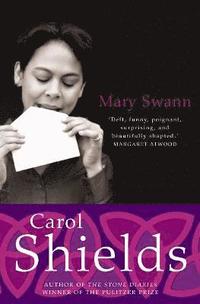Mary Swann



Köp boken på amazon.se (betald länk)
* Som Amazon-associates tjänar vi pengar på kvalificerade köp.
Begagnade:

Mary Swann, a sort of Canadian Emily Dickinson, submitted a paperbag full of poems to newspaper editor Frederic Cruzzi just hours before her husband hacked her to pieces. Who is Mary Swann? And how could someone in all ways completely isolated have produced these works of genius? The pedant misogynist and Mary Swann's biographer, Morton Jimroy is determined to prove that her work shows a debt to T S Eliot. But the local librarian, timid Rose Hindmarch, whose life up until now has held no excitement, know that Mary Swann only read trash and that the library didn't even have T S Eliot's work on the shelves. To stay in the limelight, however, she'll say whatever is required. Frederic Cruzzi tries to understand the motive. And he should know. Sarah Maloney, who made a name for herself as a young feminist scholar, is intent of discovering a clue to Mary Swann in the poet's domestic notebooks. But there is nothing there except the entirely mundane. Anyway, Sarah is coming to recognise a conflicting and powerful pull of domesticity in herself. Four flawed individuals, but all with some self knowledge, who find in Mary Swann the key to the fulfilment of their needs, but understand Mary Swann herself not at all. Perhaps only we the reader understand what there is to know, what it is possible to know.
Bok recensioner av Mary Swann :
2010-02-27 13:12
Boken börjar bra och är helt okej, men slutet, som är skrivet som ett filmmanus, känns långrandig och när mysteriet är löst, känner jag främst en besvikelse.
En mycket mager trea.
En mycket mager trea.
Betyg 3


"
Köp boken på amazon.se (betald länk) * Som Amazon-associates tjänar vi pengar på kvalificerade köp.
Skriv egen bokrecension till Mary Swann
Liknande böcker:
Den första boken
K. Ramqvist
K. Ramqvist
Strafflös
L. Ebervall och Samuelson
L. Ebervall och Samuelson
Layla
C. Hoover
C. Hoover
Fallet Walter Dabney
D. Baldacci
D. Baldacci
Babel : eller om vålde..
R. Kuang
R. Kuang
Ansiktena
T. Ditlevsen
T. Ditlevsen
17 juni
A. Schulman
A. Schulman
Flicka A
A. Dean
A. Dean
Upprepningen
V. Hjort
V. Hjort
Vingården för vilda dr..
C. Säfstrand
C. Säfstrand
Samma Författare:
